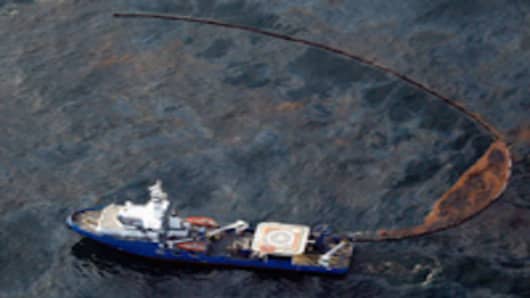In what could become a more damaging oil spill than the Exxon Valdez more than 20-years ago, the news out of Louisiana is getting worse by the hour.
High winds and rising surf are forcing the oil to shore more quickly and over a wider space. Florida has declared a disaster area, and there is little doubt that it will affect Mississippi and Alabama, too.
“The challenge we’re having now is with the weather, the wind is really blowing them around,” said BP spokesperson Marti Powers. “But we’re not giving up.”
More than 20,000 barrels of an oil/water mixture have been recovered. But in the context of at least 5,000 barrels of pure crude spilling out each day, it still appears to be a losing battle.
BP is trying to drill next to the leaking valve to relieve pressure and eventually stop the oil bleed. “It’s still a very active operation,” Powers said.
It took billions to clean up the Valdez mess, which spewed 260,000 barrels of oil into Prince William Sound.
This time, the oil is flowing at 5,000 barrels a day. Even though it will take some time to reach a quarter million barrels, there are more active industries going on in the Gulf Coast.
Louisiana is the nation’s No. 1 producer of oil. It is the nation’s No. 2 producer of natural gas. And It is the nation’s No. 2 producer of seafood.
So, even though you have not yet seen ubiquitous images of oil slicked birds, business here has already been dramatically affected by the spill.
The local population, from the shrimpers to the restaurant owners, are more than a little nervous, mainly because some view this as potentially worse than 2005’s Hurricane Katrina.
“It’s very devastating for this industry,” said Acy J. Cooper, Jr., a lifelong shrimper who has joined in the class-action lawsuit against oil giant BP. “We’re not only worried about today, but also long term.
“Once that stuff (the oil) gets in there, there’s no telling when it’ll come back.”
With Hurricane Katrina, the damage was severe, but once the water settled, the locals knew what they were up against. If entire careers are wiped out by the spill, people like Acy Cooper, Jr. won’t have a way to make money.
“Venice where we live at right now is a fishing village – our whole economy is built on fishing and oil, so when you take that away from us, there’s nothing else for us to do,” Cooper said. “With Katrina we lost everything. It’s been five years. Coming back from Katrina was hard, but this will be harder. With Katrina, we had a few options. We could go out and make a dollar. With here, how can you do that?”
Local governments, along with BP, have begun training residents for paid positions to help clean up, but as of late Friday, most of the people out on the water were from outside the region.
For James C. Klick, the lawyer who filed the BP suit, it’s too little too late … even though the shrimp season hasn’t even officially started.
“It’s a terrible tragedy for everyone. It’s impacted them already,” said James C. Klick. “Their season is likely to be closed this year. Oil is already in Redfish Bay, killing shrimp.
“There’s almost no likelihood that there will be a season this year.”
This entire region depends on fishing and oil. If the fishing season is literally killed, and politics slow the oil industry, there will be a likelihood that very few people will be able to get by.



